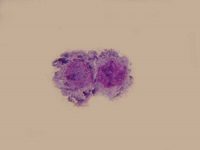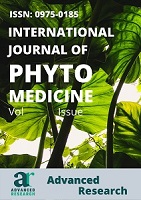Antitumor Activity of Methanolic Extract of Pisonia Aculeata Leaf
Keywords:
Pisonia aculeata, ehrlich ascites carcinoma, tumorAbstract
In order to scientifically appraise some of the anecdotal, folkloric, ethno medical uses of Pisonia aculeata Linn. (Nyctaginaceae), the present study was undertaken to examine the antitumor activity of methanolic extract of Pisonia aculeata leaves extract on Ehrlich Ascites Carcinoma (EAC) in mice. Tumor was induced in mice by intraperitoneal injection of Ehrlich Ascites Carcinoma cells (1X10 6 cells/mouse). Methanolic extract of Pisonia aculeata (MPA) was administered to the experimental animals at the doses of 200 & 400 mg/kg/day, p.o. The antitumor effect of the extract was evaluated by using survival time, haematological parameters, increase in body weight, solid tumor volume and peritoneal cell count. Oral administration of MPA increased the survival time and inhibits the weight gain of the tumor bearing mice. After 14 days of inoculation, the extract also reduces the solid tumor volume developed by the EAC cells. The findings of this study indicate that the MPA possesses significant antitumor activity on dose dependent manner.
References
Ramakrishna Y, Manohor AI, Mamata P,
Shreekant KG. Plants and novel antitumor
agents: A review. Indian Drugs.
;21:173-85.
Kinghorn AD, Balandrin MF. Human
Medical Agents from Plants. Am Chem
Soc Symp Series 534. Washington, DC:
Am Chem Soc. 1993;80–95.
Gerzon K. Anticancer Agents Based on
Natural Product Models. Cassady JM,
Douros JD, eds. New York: Academic
Press. 1980;271–317.
Wall ME, Wani MC. Human Medicinal
Agents from Plants. Kinghorn AD,
Balandrin MF, eds. Am Chem Soc Symp
Series 534. Washington, DC: Am Chem
Soc. 1993;149–69.
Mascarenhas M. Structure-activity
characterization, a quick method to screen
mushrooms for the presence of anti tumor
glucans. Mushroom Res. 1994;3:77–80.
Chuang SE, Kuo, ML, Hsu CH, Chen CR,
Lin JK, Lai M, Hsieh GY, Cheng AL.
Carcinogenesis. 2000;21:331–5.
Nadkarni A.K., Indian Materia Medica,
Vol. 1, Popular Prakashan, Bombay.
;972-973.
Katzung BG. Basic and Clinical
Pharmacology. In: Cancer chemotherapy.
Sydney et al (edts), Appleton & Lange,
Connecticut. 1992;pp766-767.
Suffness M and Douros, J. Methods in
Cancer Research, Vol. XVI. Academic
Press, New York. 1979;p. 116.
Mascarenhas M. Structure-activity
characterization, a quick method to screen
mushrooms for the presence of antitumor
glucans. Mushroom Res. 1994;3:77-80.
Clarkson BD, Burchenal JH. Preliminary
screening of antineoplastic drugs. Prog.
Clin. Cancer. 1965;1:625-029.
Oberling C and Guerin M. The role of
viruses in the production of cancer. Adv.
Cancer Res. 1954;2:353-423.
Kavimani S and Manisenthlkumar KT.
Effect of methanolic extract of
Enicostemma littorale on DALton's ascitic
lymphoma J. Ethnopharmacol.
;71:349-352.
Kavimani S, Manisenthikumar KT, Ilango
R and Krishnamoorthy G. Biol. Pharm.
Bull. 1999;22:1251-1252.
Price VE and Greenfield RE. Anemia in
cancer. Adv. Cancer Res. 1958;5:199-
Hogland HC. Hematological
complications of cancer chemotherapy.
Semin Oncol. 1982;9:95-102.
Fenninger LD and Mider GB. Energy and
nitrogen metabolism in cancer. Adv.
Cancer Res. 1954;2:229-253.
Yagi K. Lipid peroxides and human
diseases. Chem. Physiol. Lip.
;45:337-351.
Sinclair AJ, Barnett AH, Lunic J. Free
radical and auto-oxidant systems in health
and disease. Br J. Hos Med. 1990;43:334-
Suny Obserley LW, Elwell JH, Sierra
Rivera E. Antioxidant enzyme activities
in normal and transformed mice liver
cells. Int J. Cancer. 1989:44:1028-1033.
Feng Q, Kumangai T, Torii Y, Nakamura
Y, Osawa T and Uchida K.
Anticarcinigenic antioxidants as inhibitors
against intracellular oxidative stress. Free
Rad. Res. 2001;35:779-788.
Marklund SL, Westman NG, Lundgren E
and Roos G. Copper and zinc containing
superoxide dismutase, manganese
containing superoxide dismutase, catalase,
and glutathione peroxidase in normal and
neoplastic human cell lines and normal
human tissues. Cancer Res.
;42:1955-1961.
Jiau-Jian L and Larry WO.
Overexpression of manganese-containing
superoxide dismutase confers resistance
to the cytotoxicity of tumor necrosis
factor ∝ and/or hyperthermia. Cancer Res.
;57:1991-1998.
Ruby AJ, Kuttan G, Babu KD,
Rajasekharan KN and Kuttan R.
Antitumor and antioxidant activity of
natural curcuminoids. Cancer Lett.
;94:79-83.
Ming L, Jill CP, Jingfang JN, Edward C,
and Brash E. Antioxidant action via p53
mediated apoptosis. Cancer Res.
;58:1723-1729.
Putul M, Sunit C and Pritha B.
Neovascularisation offers a new
perspective to glutamine-related therapy.
Indian J. Exp. Biol. 2000;38:88-90.
Ravid A and Korean R. The role of
rDALtive oxygen species in the
anticancer activity of vitamin D.
Anticancer Res. 2003;164:357-367.
Prasad SB and Giri A. Antitumor effect
of cisplatin against murine ascites
DALton's lymphoma Indian J. Expt. Biol.
;32:155-162.
Cragg GM, Kingston DGI and Newman
DJ. Anticancer Agents from Natural
Products, ed. Boca Raton, Taylor and
Francis Group, Brunner-Routledge
Psychology Press, London( 2005) .
Newman DJ, Cragg GM, and Snader KM.
Natural products as a source of new drugs
over the period 1981-2002. J. Nat. Prod.
;66:1022-1037.
Kaufman PB, Leland J, Warber CS, James
A, Harry D and Brielmann L. Natural
Products from Plants, CRC Press,
London. 1999;1581-1589.
DeFeudis FV, Papadopoulos V and Drieu
K Ginkgo biloba extracts and cancer: a
research area in its infancy. Fund. Clin.
Pharmacol. 2003;17:405-417.



